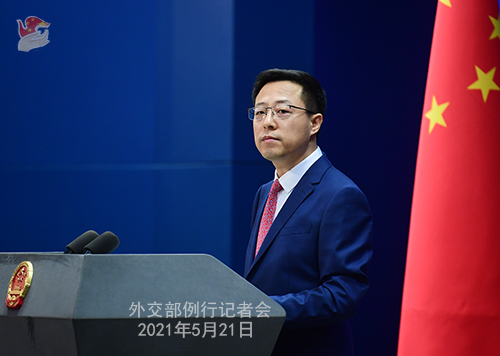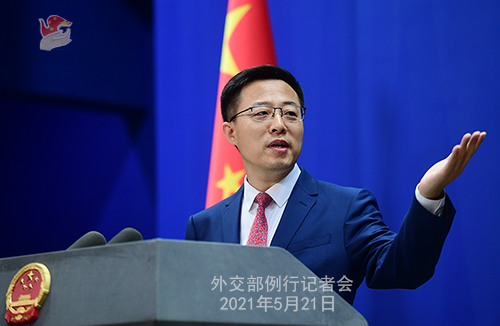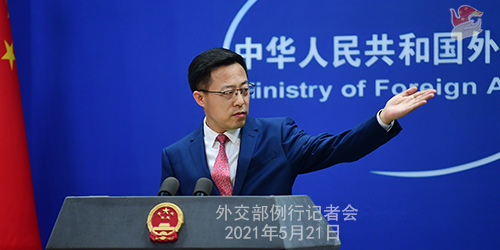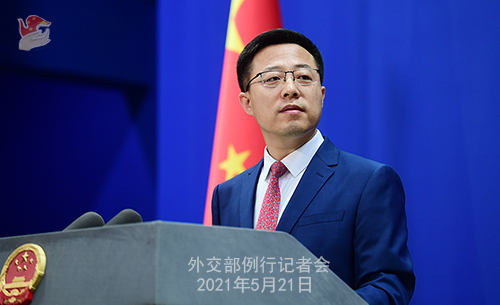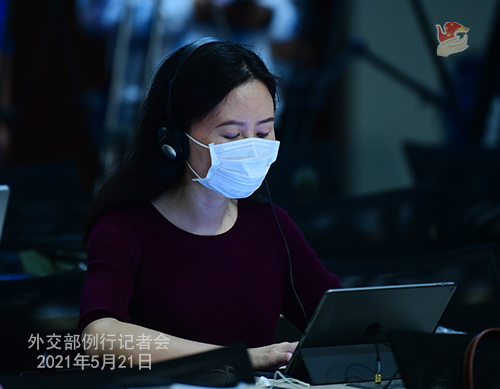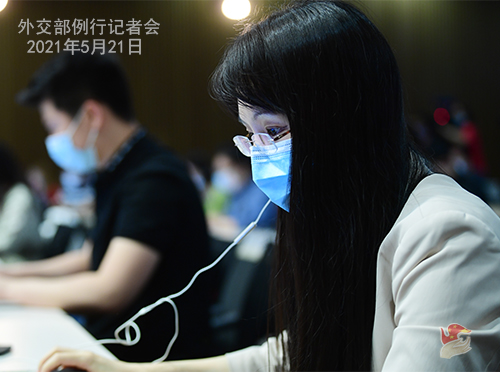| Foreign Ministry Spokesperson Zhao Lijian's Regular Press Conference on May 21, 2021 |
| 2021-05-21 20:43 |
|
Xinhua News Agency: Today marks the 70th anniversary of the establishment of diplomatic ties between China and Pakistan. China and Pakistan are all-weather strategic cooperative partners. You worked in Pakistan for many years. On this particular occasion, do you have anything to say about the development of China-Pakistan relations? What is China's outlook for China-Pakistan cooperation? Will the two sides organize any celebrations? Zhao Lijian: Today marks the 70th anniversary of the establishment of diplomatic ties between China and Pakistan. President Xi Jinping, Premier Li Keqiang and State Councilor and Foreign Minister Wang Yi exchanged congratulatory letters with Pakistani President Arif Alvi, Prime Minister Imran Khan and Foreign Minister Shah Mahmood Qureshi respectively. In the evening, the two sides will also hold celebratory receptions in Beijing and Islamabad respectively, which will be attended by the leaders of the two countries. The two governments have agreed to jointly hold more than 120 celebration activities in political, diplomatic, economic, sub-national, scientific, educational, cultural and health fields throughout the year. This will extend the warm and friendly atmosphere of celebration throughout the year and add impetus into China-Pakistan friendly relations. Over the past 70 years since the establishment of diplomatic ties, China and Pakistan have respected, trusted and supported each other through thick and thin. Together, we have forged a strong "ironclad" friendship and established an all-weather strategic cooperative partnership. In recent years, our two countries have actively built the Belt and Road Initiative, pursued high-quality development of the China-Pakistan Economic Corridor, and deepened practical and mutually beneficial cooperation across the board. This has brought more benefits to our two peoples, injected strong impetus into regional peace and development, and made positive contributions to international fairness and justice. Since last year, in the face of the COVID-19 epidemic, China and Pakistan have helped each other in times of difficulty, and our all-weather friendship has been further enhanced. China attaches great importance to China-Pakistan relations and is ready to take the opportunity of the 70th anniversary of diplomatic ties to strengthen strategic communication, deepen mutually beneficial cooperation, expand people-to-people and cultural exchanges and build a closer China-Pakistan community with a shared future in the new era. We welcome and encourage friendly people from all walks of life, especially young people, to take an active part in the celebrations marking the 70th anniversary, as part of the efforts to carry forward friendship, enhance cooperation and make greater contribution to the cause of China-Pakistan friendship. Long live China-Pakistan friendship! Chin-Pakistan dosti zindabad! (Urdu) The Paper: The 74th World Health Assembly will take place from May 24 to June 1. It is learned that the Taiwan authorities didn't receive an invitation from the WHO. Recently, many countries wrote to the WHO to support the Chinese government's decision of not agreeing to the Taiwan region's participation in this year's WHA and express the hope not to discuss Taiwan-related issues at the WHA74. Do you have any comment? Zhao Lijian: There is but one China in the world. The government of the People's Republic of China is the sole legal government representing the whole of China. The Taiwan region is an inalienable part of the Chinese territory. The one-China principle is a recognized norm of international relations and a common consensus of the international community. The Taiwan region's participation in the activities of international organizations including WHO must be handled in accordance with the one-China principle. This is a fundamental principle affirmed by the Resolution 2758 of the United Nations General Assembly (UNGA) and Resolution 25.1 of the World Health Assembly (WHA). Before 2016, China made special arrangements for the Taiwan region to participate in the WHA on the basis of the fact that both sides across the Taiwan Strait uphold the one-China principle. Since the Democratic Progressive Party (DPP) came to power, it has placed its political agenda over the wellbeing of the people in the Taiwan region, obstinately adhered to the separatist position of "Taiwan independence", and refused to admit the 1992 Consensus embodying the one-China principle. As a result, the political foundation for the Taiwan region to participate in the WHA has ceased to exist. The Chinese Central Government always attaches great importance to the health and well-being of our compatriots in the Taiwan region. Under this precondition of abiding by the one-China principle, we have made appropriate arrangements for the Taiwan region's participation in global health affairs. Since the early stages of COVID-19, the Chinese Central Government has given the Taiwan region 260 updates about the situation, and approved participation by health experts from the Taiwan region in 16 WHO technical activities. The Taiwan region received multiple notifications of information about COVID-19 from the WHO Secretariat. The claim of a "gap" in global anti-epidemic efforts is groundless. The DPP authorities, turning a blind eye to the common aspiration of the international community to focus on anti-epidemic cooperation and the life and safety of the people in the Taiwan region, are pursuing political maneuvering under the pretext of the pandemic. They violated the UNGA Resolution 2758 and WHA Resolution 25.1 and are bent on initiating proposals relating to the Taiwan region at the cost of disrupt the WHA proceedings and international cooperation. Their true intention is to create "two Chinas" or "one China, one Taiwan". In order to safeguard national sovereignty and territorial integrity and uphold the solemnity and authority of relevant UNGA and WHA resolutions, China cannot agree with the Taiwan region's participation in this year's WHA. This decision by China received broad-based support and understanding from the international community. By yesterday, over 150 countries voiced their support for our decision through diplomatic channels. Nearly 80 WHO members sent letters to the WHO to express their commitment to the one-China principle and opposition to Taiwan's participation in the WHA. This once again shows that the one-China principle is the common aspiration and the overriding trend and the fact that the overwhelming majority of countries hold a just and right position on the relevant issue. People around the world are always sharp-eyed. The US and a handful of other countries have been emboldening the DPP and clamoring for Taiwan's participation in the WHA with all kinds of petty tricks. Their attempt has no chance of success!
Bloomberg: The Canadian government announced that as of May 18, they had received 5,700 applications for a new visa for Hong Kong citizens. Do you have a reaction to this announcement? Zhao Lijian: What I want to stress is that after the national security law for HKSAR took effect, Hong Kong has seen stability restored, and people can better exercise their legitimate rights and enjoy their freedoms fully in a safe environment. This is the fact that speaks for itself. AFP: The European Parliament has passed a resolution demanding that China lifts sanctions on European lawmakers before the China-Europe investment deal can move forward. What's the foreign ministry's response to this? What's your view on the prospect of the deal? Zhao Lijian: Despite China's solemn position and strong opposition, the EU disregarded facts, twisted right and wrong, and stubbornly made a wrong decision of unilateral sanctions based on lies and disinformation. What the EU has done constitutes a gross interference in China's internal affairs, brazenly violates international laws and the basic norms of international relations, and severely undermines China-EU relations. China's decision to sanction relevant EU entities and individuals who maliciously spread Xinjiang-related lies and disinformation and severely harmed China's sovereignty and interests, is out of the need to safeguard its own interests. This is a necessary and legitimate reaction to the EU's moves of imposing sanctions and seeking confrontation. The EU's unjustified sanctions strain China-EU relations. This is what China is unwilling to see, and what China should not be blamed for. It is hoped that the EU side will make serious reflections. We have the sincerity to advance China-EU relations, but will staunchly safeguard national sovereignty, security and development interests. Sanction and confrontation will not be conducive to solving problems, and is not the way how comprehensive strategic partners should treat each other. Dialogue and cooperation is the right way forward. As a Chinese proverb goes, the one who created the trouble shall resolve it. The EU side should immediately stop interfering in China's internal affairs, abandon confrontational actions, properly manage differences through dialogue and communication, to overcome current difficulty and bring China- EU relations back to the right path of dialogue and cooperation. I would also like to stress that the China-EU investment agreement is a balanced and win-win deal, rather than a "gift" bestowed by one side to the other. China is sincere about advancing bilateral relations. We hope the EU side will work toward the same direction as China, and make the right decision that conforms to its own interests by relying more on rational thinking and less on emotional fanfare. China Daily: The China Public Diplomacy Association held an international online forum themed "Xinjiang in My Eyes" in Kashgar, Xinjiang yesterday. Can you tell us more about it? Zhao Lijian: From May 17 to 21, Wu Hailong, President of the China Public Diplomacy Association led a delegation to visit Xinjiang. On May 20, the delegation held an international online forum themed "Xinjiang in My Eyes" in Kashgar, which was attended by over 40 people, including former foreign statesmen, experts and scholars and media representatives. Talking about economic development, social prosperity, basic education, religious freedom and women's rights, the members of the delegation told their first-hand experience in Urumqi, Hotan and Kashgar. They applauded the impressive social harmony and stability in Xinjiang, the outcomes of poverty alleviation through booming feature industries, and the happy life of local residents. Foreign participants of the forum spoke up to criticize and refute the West's false reports on Xinjiang and the so-called centenary lie of "genocide". US-based international relations expert William Jones, UK-based international arbitration expert Graham Perry and Mustafa Hyder Sayed, executive director of the Pakistan-China Institute, shared their experience and told their stories about the peace, stability and development of Xinjiang. Former president of Montenegro Filip Vujanović, former Slovenian president Danilo Türk and renowned US economist Jeffrey Sachs rebuked the West's malicious attacks on Xinjiang from the perspective of international law and multilateralism. Earlier this week, I briefed you on the trip to Xinjiang made by Latin American and Caribbean diplomatic envoys, who also commended on Xinjiang's achievements of social stability, ethnic solidarity, religious harmony and livelihood improvement. We welcome more foreign friends who hold just and impartial position to visit Xinjiang and see a true and beautiful Xinjiang without the "filters" of Western countries.
AFP: What's China's reaction to the ceasefire between Israel and Hamas? Zhao Lijian: China welcomes a ceasefire between parties of the Palestine-Israel conflict and hopes relevant parties can effectively cease fire and stop violence. We appreciate the mediation efforts made by Egypt, the UN and others. China has also done a lot to promote peace talks and is ready to continue to work with the international community to further ease the tensions. The conflict that dragged on for over 10 days have resulted in grave humanitarian situation in the Gaza Strip, which requires urgent assistance from the international community. China will provide 1 million US dollars of emergency humanitarian assistance to Palestine in cash, continue to provide humanitarian supplies to the best of its ability in light of Palestine's needs, and take an active part in the reconstruction of Gaza. We will also provide tangible assistance to the Palestinian people by offering 1 million US dollars of donation and 200,000 doses of COVID-19 vaccine to the United Nations Relief and Works Agency for Palestine Refugees in the Near East (UNRWA). To prevent the tragedy of the Palestine-Israel conflict from happening again, the international community should promote the resumption of peace talks between Palestine and Israel and the settlement of the Palestinian question in a comprehensive, just and durable manner on the basis of the "two-state solution". China will push the Security Council to comprehensively review the Palestinian question and reaffirm the "two-state solution". We will invite peace advocates from Palestine and Israel to China to hold seminars in due course and welcome Palestinian and Israeli representatives to come to China for direct negotiations. NHK: The US highlighted its role in promoting the ceasefire between Palestine and Israel. Do you have any comment? Zhao Lijian: China hopes that the US can shoulder due responsibilities, take a just position, practice true multilateralism, and work with the majority members of the international community to support the Security Council in playing its due role of promoting the settlement of the Palestinian question in a comprehensive, just and durable manner. CRI: Venezuela's National Assembly has recently announced the appointment of 5 board directors and 10 substitute deputies of the new National Electoral Council. The council's new leadership include several opposition figures. The main opposition leaders of Venezuela voiced their support, while the US and a few others expressed reservations and even uttered criticism. I wonder if China has any comment on this? Zhao Lijian: China congratulates Venezuela on establishing a new national electoral council in accordance with the country's Constitution and law. It is hoped that all parties in Venezuela will take this opportunity to strengthen dialogue and consultation and bridge differences within the constitutional framework, so as to jointly promote stability and development. China has always opposed external interference in the internal affairs of Venezuela, and calls on the international community to respect Venezuela's right to self-determination and play a constructive role in the political settlement of relevant issues.
Bloomberg: At the public diplomacy event yesterday on Xinjiang, you mentioned Jeffrey Sachs, he made a comment, I'll just read it out: "I know the UN High Commissioner for Human Rights and the UN Human Rights Council has been in discussion with the government of China to have an independent investigation and review of the situation", referring to Xinjiang. Can you tell us more about the progress on this? Zhao Lijian: China has elaborated its position on the visit to Xinjiang by the UN High Commissioner for Human Rights on many occasions. China already extended invitation to the High Commissioner for visiting Xinjiang and other places in China, and the two sides are in communication on that. The purpose of the visit is to enhance bilateral exchange and cooperation rather than carry out so-called "investigations" with the presumption of guilt. We welcome the visit to Xinjiang by all people that hold a fair and just position. What we oppose is slandering against Xinjiang by those with tinted glasses and ideological bias. Reuters: Lithuania's Parliament passed a resolution to describe China's action towards the Uyghurs as a "genocide" and called on Hong Kong to abolish the national security law. Does China have a response? Zhao Lijian: The accusation of the so-called "genocide" in Xinjiang is an out-and-out lie. Its real purpose is to undermine social stability in Xinjiang and curb China's development. Issues related to Hong Kong are purely China's internal affairs, which allow no interference by any external forces. China's will and determination to safeguard its national sovereignty, security and development interests are unshakable. We firmly oppose gross interference of relevant parties in Lithuania in China's internal affairs and urge them to immediately correct their mistakes and avoid damaging the overall interests of bilateral relations. Hubei Media Group: According to reports, as the White House and the US Republicans and Democrats push more anti-China bills, 66 anti-war and progressive groups and at least four lawmakers raised questions over them and released a joint statement decrying the demonization of China by the White House and certain legislators. They said this won't help solve domestic problems but only feeds anti-Asian hate and violence. Do you have any comment? Zhao Lijian: We noted that recently, more and more insightful people in the US have spoken up with objective and rational voice to reject demonization of China. This is undoubtedly in the interests of the US and American people. As the world's two largest economies, China and the United States have highly intertwined interests. Cooperation between the two countries will contribute greatly to the well-being of our two peoples and to our joint efforts to address global challenges such as climate change, infectious diseases, and post-epidemic recovery. A confrontation between China and the US spells disaster to both countries and the world. There are always some people in the United States who cling to the zero-sum mentality of the Cold War and ideological bias, play up the "China threat theory" and tout an all-out strategic competition with China, and even stoke decoupling and confrontation between the two sides. This runs counter to the common aspiration of the two countries and people around the world for China-US exchanges and cooperation. I would like to reiterate that China's development path and domestic and foreign policies are clear and consistent. The goal of China's development is to enable the Chinese people to live a better and happier life, rather than to outcompete the US. China is committed to developing a relationship with the United States featuring non-conflict, non-confrontation, mutual respect and win-win cooperation. At the same time, we will continue to firmly safeguard China's sovereignty, security and development interests. We hope that the US administration and Congress will listen to the objective and rational voice at home, look at China's development and China-US relations correctly, stop groundless slanders and accusations against China, stop pushing negative China-related bills, and do more to promote China-US relations and world peace, stability and prosperity. South China Morning Post: It is reported that the Japanese Defense Minister Nobuo Kishi said that considering China's increased capabilities, Japan must speed up the efforts to increase its defense capabilities. The report believes that the statement signals Japan's readiness to do away with its long-standing 1% GDP ceiling for annual defense spending. Do you have any comment? Zhao Lijian: I have taken note of relevant reports. I also noticed that the relevant Japanese official cited China's increased capabilities as the most important reason for Japan's decision to increase defense budget and alleged that the situation in Taiwan should be taken as Japan's own problems and that Japan will discuss with the US relevant revisions of the Guidelines for Japan-US Defense Cooperation. The Japanese side made these irresponsible remarks to blatantly advocate arms race, play up regional tensions, provoke military confrontation, and even attempt to interfere in the Taiwan question and China's internal affairs. Such actions are extremely vile in nature. China is strongly dissatisfied with and firmly opposed to that. I would like to stress the following points. First, China follows the path of peaceful development and is committed to a national defense policy that is defensive in nature. The development of China's national defense forces is necessitated by the need to safeguard its own sovereignty, security and development interests, and to uphold international and regional peace and stability. China will continue to be a promoter of world peace, a contributor to global development and a defender of the international order. No matter how strong China grows, it will never seek hegemony, expansion or sphere of influence. China has no interest in engaging in an arms race with anyone. Second, the Taiwan question is purely China's internal affairs that brook no foreign interference in any form. China must and will be reunified. A small group of people in Japan have always been obsessed with the obsolete illusion of reviving militarism, showing no repent and harboring wild ambitions. They want to get their hands on Taiwan even till this day. We once again warn the Japanese side that the determination and will of the Chinese government and military to safeguard national sovereignty, security and unity is rock-solid. Japan should not overstretch itself. Third, aggression and expansion launched by Japanese militarism in modern times have inflicted untold sufferings on the people in Asia, including China. Japan is a defeated country in World War II. Its belligerent moves are aimed at shaking off the post-war shackles and return to the old path of military expansion. As an ally of the US whose military spending accounts for nearly 40% of the world's total, Japan has been flexing muscles everywhere while criticizing other countries' normal military development. This is extremely unjustified. I urge the Japanese side to reflect on itself, stop undermining regional peace and stability, and stop slandering China.
Reuters: Taiwan's health minister said that he spoke to the US health minister to ask for help in obtaining COVID-19 vaccines. Would China like to comment? Zhao Lijian: First of all, I would like to correct you on the term "health minister" because we do not recognize the so-called "minister" of Taiwan. It is pointless for the Taiwan region to seek independence and engage in political manipulation under the pretext of COVID-19. Beijing Youth Daily: It is reported that Singapore's Prime Minister Lee Hsien Loong said on May 19 that everything is at stake for the rest of the world, if China-US relationship turns sour, and that China and the US should "work together to find common ground where they can cooperate". Singapore's Deputy Prime Minister and Coordinating Minister for Economic Policies Heng Swee Keat said on May 20 that the competition between China and the US within a sound system can "create better solutions to the world's challenges" . Do you have any comment? Zhao Lijian: A stable and sound China-US relation is not only in line with the fundamental interests of our two peoples, but also a shared expectation of regional countries and the international community. China remains committed to a relationship featuring non-conflict, non-confrontation, mutual respect and win-win cooperation with the US. In the meantime, we will firmly uphold national sovereignty, security and development interests. The US side should conform to the trend of the times, heed the aspirations of regional countries, view China from an objective perspective, and meet China halfway, to enhance dialogue, highlight cooperation, manage differences, so as to promote the sound and steady growth of China-US relations. CCTV: It is reported that in response to the claim of Cambodia's over-reliance on China, Cambodia's Prime Minister Hun Sen said at the Future of Asia conference on May 20 that "if I don't rely on China, who will I rely on?" He also said that China's infrastructure investment is indispensable to Cambodia's economic growth. Do you have any comment? Zhao Lijian: We highly appreciate Prime Minister Hun Sen's relevant statement. Prime Minister Hun Sen is a veteran statesman in the region , and a good old friend of the Chinese people. With acute political insight and strategic vision, he always holds an objective and just position on major issues. He not only made outstanding contribution to promoting Cambodia's national development and safeguarding national dignity, but also made positive efforts in upholding democracy in international relations, and peace, stability and development of the region and the world. China values highly its relations with Cambodia. Our two countries are committed to carrying forward traditional friendship, and actively building a community with a shared future. As Prime Minister Hun Sen put it, China's help to Cambodia is sincere with no strings attached. China has provided and will continue to offer help within its capacity to facilitate Cambodia's economic development and livelihood improvement, so that two peoples, especially Cambodians, will obtain tangible benefits from China-Cambodia win-win cooperation. Reuters: Staff at some Chinese government offices have been told not to park their Tesla cars inside government compounds. Are you aware of the relevant situation? Zhao Lijian: I am not aware of the situation you mentioned.
|
 |
| ||||||||||||||||
|
||||||||||||||||


